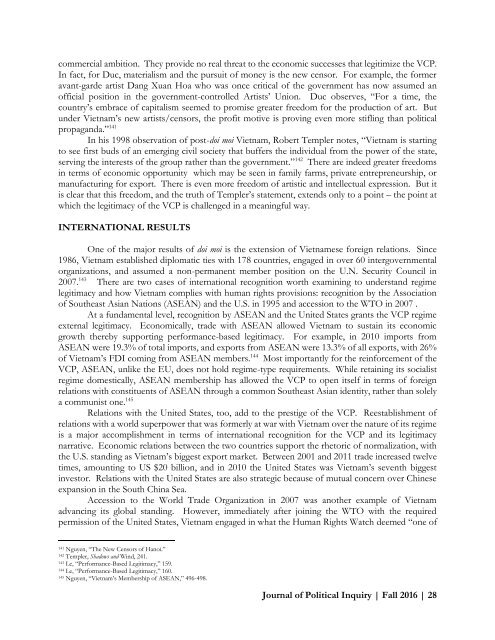Fall2016_Final
Create successful ePaper yourself
Turn your PDF publications into a flip-book with our unique Google optimized e-Paper software.
commercial ambition. They provide no real threat to the economic successes that legitimize the VCP.<br />
In fact, for Duc, materialism and the pursuit of money is the new censor. For example, the former<br />
avant-garde artist Dang Xuan Hoa who was once critical of the government has now assumed an<br />
official position in the government-controlled Artists’ Union. Duc observes, “For a time, the<br />
country’s embrace of capitalism seemed to promise greater freedom for the production of art. But<br />
under Vietnam’s new artists/censors, the profit motive is proving even more stifling than political<br />
propaganda.” 141<br />
In his 1998 observation of post-doi moi Vietnam, Robert Templer notes, “Vietnam is starting<br />
to see first buds of an emerging civil society that buffers the individual from the power of the state,<br />
serving the interests of the group rather than the government.” 142 There are indeed greater freedoms<br />
in terms of economic opportunity which may be seen in family farms, private entrepreneurship, or<br />
manufacturing for export. There is even more freedom of artistic and intellectual expression. But it<br />
is clear that this freedom, and the truth of Templer’s statement, extends only to a point – the point at<br />
which the legitimacy of the VCP is challenged in a meaningful way.<br />
INTERNATIONAL RESULTS<br />
One of the major results of doi moi is the extension of Vietnamese foreign relations. Since<br />
1986, Vietnam established diplomatic ties with 178 countries, engaged in over 60 intergovernmental<br />
organizations, and assumed a non-permanent member position on the U.N. Security Council in<br />
2007. 143 There are two cases of international recognition worth examining to understand regime<br />
legitimacy and how Vietnam complies with human rights provisions: recognition by the Association<br />
of Southeast Asian Nations (ASEAN) and the U.S. in 1995 and accession to the WTO in 2007 .<br />
At a fundamental level, recognition by ASEAN and the United States grants the VCP regime<br />
external legitimacy. Economically, trade with ASEAN allowed Vietnam to sustain its economic<br />
growth thereby supporting performance-based legitimacy. For example, in 2010 imports from<br />
ASEAN were 19.3% of total imports, and exports from ASEAN were 13.3% of all exports, with 26%<br />
of Vietnam’s FDI coming from ASEAN members. 144 Most importantly for the reinforcement of the<br />
VCP, ASEAN, unlike the EU, does not hold regime-type requirements. While retaining its socialist<br />
regime domestically, ASEAN membership has allowed the VCP to open itself in terms of foreign<br />
relations with constituents of ASEAN through a common Southeast Asian identity, rather than solely<br />
a communist one. 145<br />
Relations with the United States, too, add to the prestige of the VCP. Reestablishment of<br />
relations with a world superpower that was formerly at war with Vietnam over the nature of its regime<br />
is a major accomplishment in terms of international recognition for the VCP and its legitimacy<br />
narrative. Economic relations between the two countries support the rhetoric of normalization, with<br />
the U.S. standing as Vietnam’s biggest export market. Between 2001 and 2011 trade increased twelve<br />
times, amounting to US $20 billion, and in 2010 the United States was Vietnam’s seventh biggest<br />
investor. Relations with the United States are also strategic because of mutual concern over Chinese<br />
expansion in the South China Sea.<br />
Accession to the World Trade Organization in 2007 was another example of Vietnam<br />
advancing its global standing. However, immediately after joining the WTO with the required<br />
permission of the United States, Vietnam engaged in what the Human Rights Watch deemed “one of<br />
141<br />
Nguyen, “The New Censors of Hanoi.”<br />
142<br />
Templer, Shadows and Wind, 241.<br />
143<br />
Le, “Performance-Based Legitimacy,” 159.<br />
144<br />
Le, “Performance-Based Legitimacy,” 160.<br />
145<br />
Nguyen, “Vietnam’s Membership of ASEAN,” 496-498.<br />
Journal of Political Inquiry | Fall 2016 | 28
















